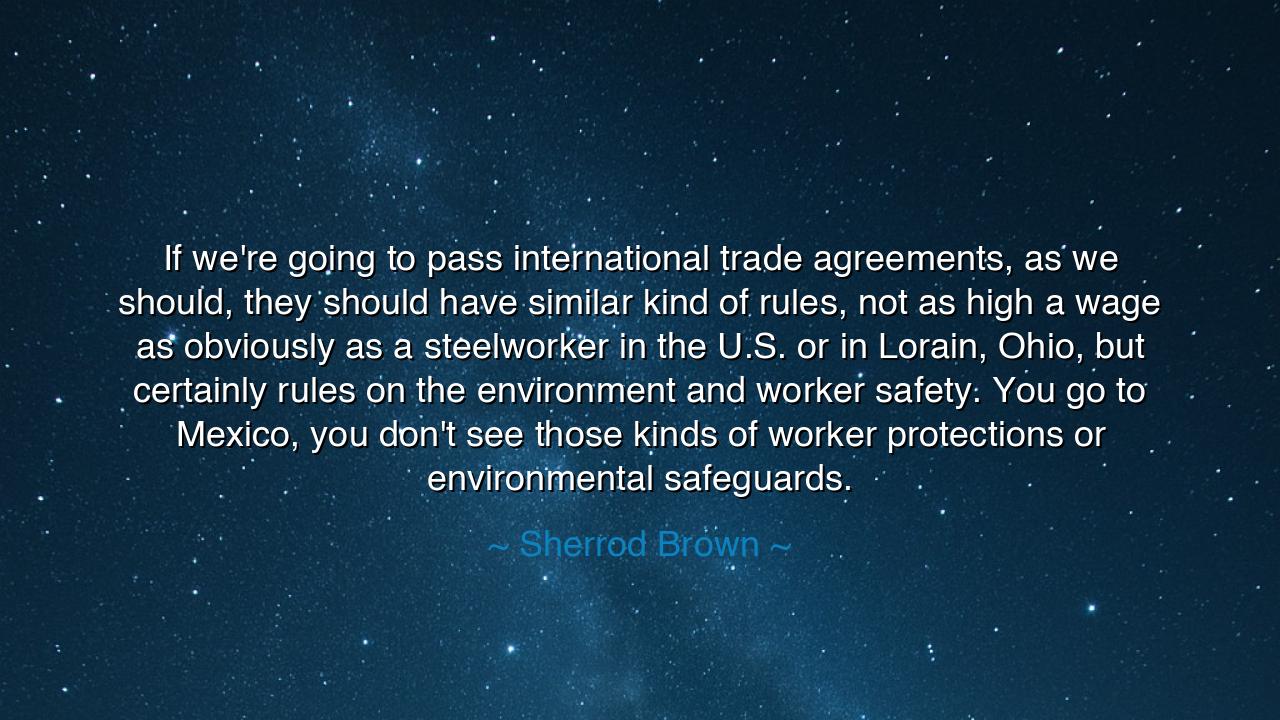
If we're going to pass international trade agreements, as we
If we're going to pass international trade agreements, as we should, they should have similar kind of rules, not as high a wage as obviously as a steelworker in the U.S. or in Lorain, Ohio, but certainly rules on the environment and worker safety. You go to Mexico, you don't see those kinds of worker protections or environmental safeguards.






Sherrod Brown once spoke with the earnest voice of justice: “If we’re going to pass international trade agreements, as we should, they should have similar kind of rules, not as high a wage as obviously as a steelworker in the U.S. or in Lorain, Ohio, but certainly rules on the environment and worker safety. You go to Mexico, you don’t see those kinds of worker protections or environmental safeguards.” His words rise from the heart of labor and fairness, declaring that commerce between nations must not be built upon exploitation, but upon shared responsibility and dignity.
When he speaks of international trade agreements, Brown reminds us that in our age the markets of the world are no longer divided by mountains or oceans. Goods, money, and labor cross borders with ease, and the prosperity of one nation is bound to the fate of another. Yet this weaving of economies also creates danger: that some nations will exploit the weakness of others, driving down standards, sacrificing the health of workers and the earth for fleeting profit. His cry is not against trade itself, but against trade that forgets morality.
The mention of the steelworker in Lorain, Ohio, carries deep symbolism. The steelworker is not merely a laborer, but a symbol of the American heartland, of sweat and strength that built cities and armed nations. Their wages, their protections, and their dignity were won through long struggle—strikes, unions, and sacrifice. Brown’s point is that while it is not reasonable to demand equal wages across nations with different economies, it is just to demand that all workers, whether in Ohio or Mexico, labor under rules of fairness, safety, and respect. For without such standards, trade becomes nothing more than a race to the bottom.
History itself teaches this. In the early Industrial Revolution, England’s factories grew rich, but children worked in soot-filled rooms, women labored to exhaustion, and rivers ran black with waste. It was only through reform—laws on child labor, on working hours, on pollution—that balance was restored. The lesson of history is that industry without worker safety and environmental safeguards devours both people and land. To ignore this in modern trade is to repeat the sins of the past on a global scale.
By naming Mexico, Brown does not condemn a people, but reveals the imbalance between nations. Where protections are weaker, companies may seek cheaper labor, avoiding the higher standards demanded at home. This not only harms foreign workers but also undermines those at home, for it pits worker against worker across borders. In this, Brown’s words echo an ancient truth: that justice is indivisible. One cannot build fairness for one people while tolerating injustice for another. If one suffers, all are weakened.
The emotional force of his teaching is also a call to courage. To demand rules on the environment and worker safety in trade is to resist the lure of cheap goods and easy wealth. It is to say that prosperity is not measured in price alone, but in the dignity of labor and the health of the earth. Like the prophets of old who cried against dishonest scales and exploitative merchants, Brown insists that trade without justice is corruption, and that a true economy is one that serves humanity, not enslaves it.
The lesson for us, then, is clear: in a world bound together by commerce, we must not close our eyes to the conditions of those who make the goods we consume. Support trade that uplifts, not trade that exploits. Demand environmental safeguards and worker protections, not only for your own community but for those across the seas. For only when fairness crosses borders will peace and prosperity endure.
So let Sherrod Brown’s words be passed down as wisdom: wealth without justice is ruin, but wealth with fairness is strength. Let us, therefore, labor not only for our own wages but for the dignity of all who work. Let us build trade agreements not as instruments of greed, but as covenants of equity between nations. In this way, we honor both the worker in Lorain and the worker in Mexico, and we forge a world where prosperity is shared, and justice is the foundation of commerce.






AAdministratorAdministrator
Welcome, honored guests. Please leave a comment, we will respond soon